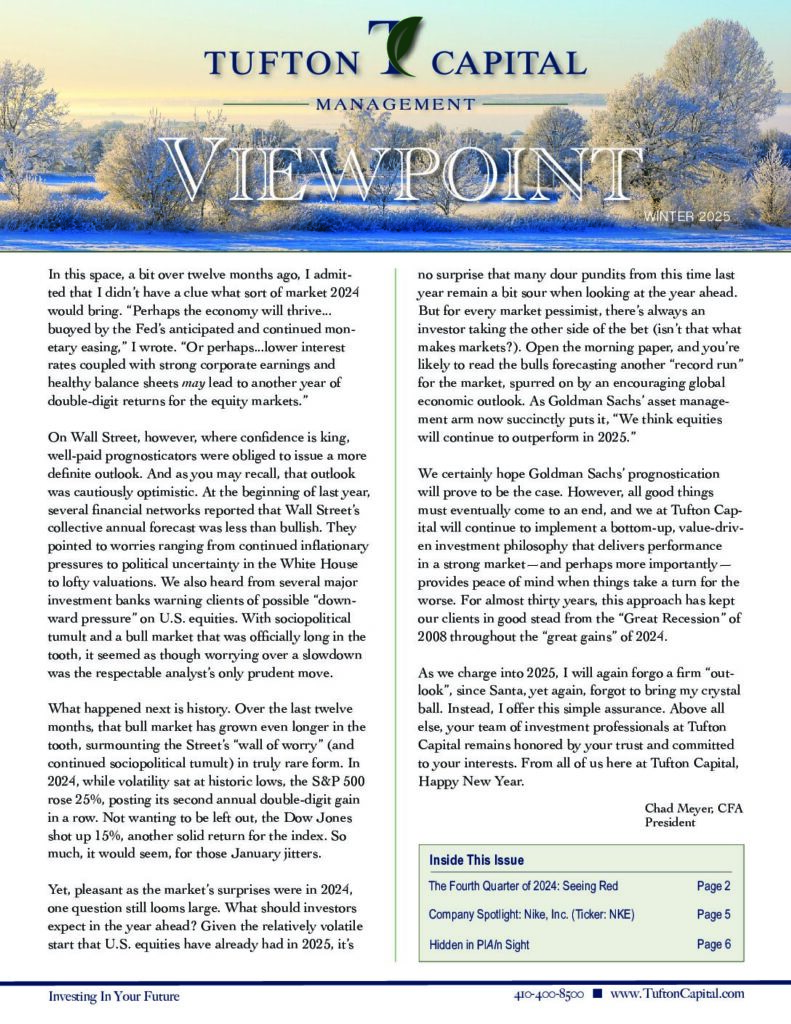The Weekly View (7/16/18)
What’s On Our Minds:
Banks : Don’t Stress the Test
Our focus turns to financials this week, as the sector floods the newswires with reported earnings for the second fiscal quarter of 2018. Of the six largest American lenders, Wells Fargo, Citigroup, and JP Morgan released their results on Friday, and Bank of America, Goldman Sachs, and Morgan Stanley are slated to announce this week. For the most part, the “bulge brackets” took home record profits for the year’s first quarter, but the picture is a bit distorted from accounting changes due to the tax cut and relaxing regulations, making Q2 earnings a more accurate long-term indicator of financial health. It is not just the economic calendar, however, that has our minds on Wall Street. As a gloomy June has given way to clear blue skies these past couple weeks in the Tufton Valley, so too have the clouds lifted for most of the big banks in New York.
The Federal Reserve recently put 35 financial institutions through a series of tests intended to gauge their ability to survive a recession without requiring a government bailout a la the 2008 financial crisis. The test was implemented as part of the Dodd-Frank Act, and measures how well-prepared large (>$100 billion in assets) banks are to continue operating through adverse economic conditions. The results answered two questions:
1) Do these critically-important firms have enough capital to weather the storm of a severe crisis?
2) Is their proposed capital plan sufficient to keep them stable enough in the future through adverse economic conditions?
The Fed’s answer: yes, and maybe.
34 out of 35 passed the initial phase with no trouble, with Deutsche Bank’s U.S. arm being the only failure. Considering this is the first year DB has been subject to the entire process, it is certainly not a vote of confidence for the struggling German company. Others, such as Goldman Sachs and Morgan Stanley, passed the initial test but had their capital plans rejected. This is not a full rebuke, however, as the two firms are permitted to keep their dividends and share buybacks at previous year levels until an acceptable proposal is put forth.
So, what does it all mean for you? While we may shy away from concrete predictions on the timing of the next economic downturn, if history is indication, it is coming eventually. As we told you last week, the bull market is long in the tooth, and it is good to know that the organizations we depend on to spur economic growth can withstand gale force winds. Just don’t expect their stocks to go to the moon. Though most banks passed and had their plans accepted, they are still beholden to more restrictions than companies in most other sectors. The stress test process in general bodes well for the long-term health of the institutions involved and the economy as a whole, which we here at Tufton Capital will gladly take over short-term and perhaps short-lived quarter-to-quarter gains.
Last Week’s Highlights:
Celebrations erupted in Paris yesterday as France won the 2018 World Cup, beating underdog Croatian team 4-2. With little in the way of geopolitical news on the trade war front, it was a solid week for the markets. Most indices continued climbing up and to the right, and the Dow finally moved back into positive territory for the year, posting a 2.3% gain. The NASDAQ continued its 2018 tear reaching a record high, while the S&P 500 hummed along with solid gains as well. Government bonds stayed relatively unchanged, with overall trade volume staying low as expected for this time of year.
Looking Ahead:
Earnings season begins in earnest, with familiar giants like Netflix, Johnson & Johnson, General Electric reporting second quarter results. Financials lead the way this week, however, with many looking to Goldman Sachs, Bank of America, Morgan Stanley, BB&T, and BNY Mellon to see how the big banks have handled Q2 volatility. Retail sales data comes out today, giving us a clue into the larger consumer spending picture, followed by industrial production numbers tomorrow. Jerome Powell testifies in front of Congress on Tuesday and Wednesday, hopefully giving us more insight into the Federal Reserve’s intentions with monetary policy for the rest of the year, especially regarding the possibility of on economic downturn.



